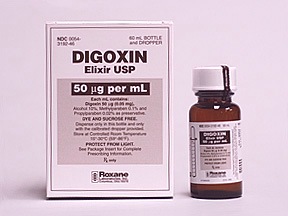Digoxin toxicity occurs when high levels of digoxin are found in the blood. People who are inflicted with this type of poisoning will manifest a number of symptoms. There are several factors that can give rise to this condition, and this requires prompt medical attention as it may lead to death if treatment is delayed.
Digoxin toxicity is a life-threatening condition and treatment must be given promptly once the symptoms are noted. Certain groups of people might be more vulnerable to digoxin toxicity and the digoxin test is an effective tool in assessing the levels of digoxin in the bloodstream.

What is digoxin and how is it used?
Digoxin refers to a chemical substance which is extracted from the digitalis lanata plant. It has been used in treating certain health conditions when given in normal doses. Digoxin is used in treating certain kinds of heart problems such as congestive heart failure, wherein the heart muscles have become so weak thus impeding the optimal flow of the blood throughout the body. Digoxin is also used in treating a condition called tachyarrhythmias, which is characterized by irregular heart beat. When digoxin is found at high levels in the blood, digoxin toxicity occurs.
At what level is digoxin non-toxic?
Digoxin toxicity will not occur when the substance the body is within the normal levels. The healthy level of digoxin is anywhere between 0.8 and 2.0 ng/mL. Digoxin becomes toxic when it is found in large amounts. There are several things that can affect the levels of digoxin in the body, making digoxin toxicity to likely happen.
Who will most likely be affected by digoxin toxicity?
There are people who are more susceptible to digoxin toxicity, and they are:
- Those who are diagnosed with atrial fibrillation or congestive heart failure. The blood levels of these patients are closely monitored to determine if the level of digoxin is within the normal range or not.
- Individuals who have history of allergic reactions.
- Those who are taking digoxin at large doses.
- People who have suffered from ventricular fibrillation in the past.
- Persons who have undergone heart attacks, electrolyte imbalance, problems related to the thyroid and kidney diseases.
- People who are taking medications for particular types of chronic diseases.
What causes digoxin toxicity?
Digoxin toxicity can occur due to a number of reasons, and these are:
- High levels of digoxin in the blood
People who are treated with digoxin are at risk of having digoxin toxicity. This is the reason why their blood is closely monitored to check the level of digoxin and to prevent poisoning.
- Decreased tolerance of the body to medication
An elevated digoxin level is an indication that the treatment procedure is not working.
- Lowering of potassium levels in the body
Potassium levels will decrease due to diarrhea, vomiting and diuretic water pills.
- Certain medications
Some medicines can increase the digoxin level in the body, and some of these are indomethacin, quinine, some antibiotics and herbs; anticholinergics, verapamil, amiodarone, diltiazem and nifedipine.
Digoxin toxicity symptoms
A person that is suffering from digoxin toxicity will show a number of signs and symptoms. This form of poisoning can affect the cardiovascular system, central nervous system, vision and digestive system.
- Cardiovascular symptoms
Patients who are suffering from digoxin poisoning will experience irregular heart rhythm, palpitations, slower heart rate and breathing difficulties especially when lying down.
- Central nervous system symptoms
People affected by digoxin poisoning will exhibit neurologic symptoms such as dizziness, weakness, hallucinations, confusion and headache.
- Vision problems
Digoxin poisoning can give rise to a number of vision problems such as changes in perception of colors, blurred vision, seeing bright or light spots and halos around objects.
- Digestive symptoms
Digoxin toxicity is also marked by a number of digestive symptoms such as appetite loss, diarrhea, vomiting and nausea.
Toxicity of digoxin is a life-threatening condition and prompt medical attention is needed.
How is digoxin toxicity treated?
Treatment for digoxin poisoning depends on the seriousness of the poisoning, and this could be treated by means of:
- Gastric lavage
This is undertaken when the poisoning has recently occurred in which the stomach is sprayed with water through a tube or by suctioning the stomach to remove the contents.
- Activated Charcoal
Activated charcoal attaches to the digoxin, preventing absorption into the blood.
- Dialysis
This is done to eliminate digoxin in the body.
- Digoxin Immune Fab
This is a widely used treatment for digoxin toxicity, especially in severe cases wherein an antidote called digibind is used.
- Potassium supplementation
This is done when the cause of digoxin poisoning is low potassium level.
Digoxin toxicity is an emergency condition that requires immediate medical attention. It may occur due to overmedication of digoxin, tolerance of medication, low potassium levels and certain medications. Patients must be taken to the hospital immediately once symptoms are noted.